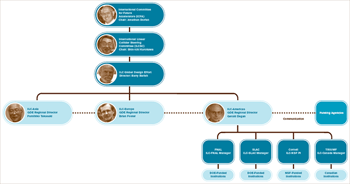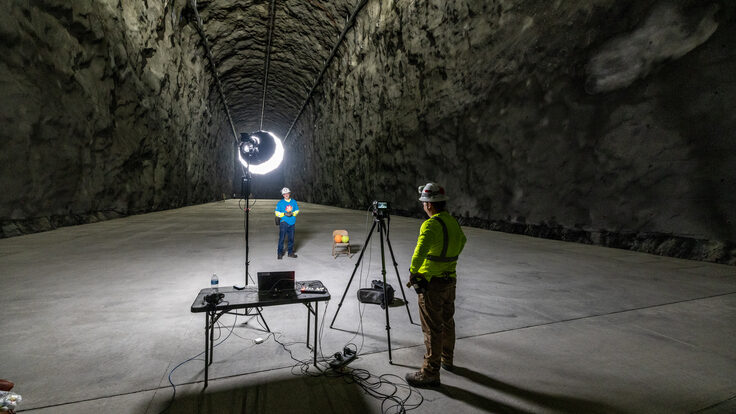Deconstruction: ILC organization
Planning designing, and funding the proposed International Linear Collider (ILC), a 40-kilometer-long electron-positron collider costing billions of dollars, will require global participation and global organization. An international team of about 20 people leads the Global Design Effort (GDE) for the ILC, headed by Barry Barish, former director of the LIGO laboratory. The GDE team sets the strategy and priorities for the work of hundreds of scientists and engineers at universities and laboratories. Their goal: produce an ILC Conceptual Design Report by the end of 2006 and an ILC Technical Design Report by the end of 2008. Policy-makers will use the reports to decide the future of the project.
ICFA: Planning the collaborative future
Since 1976, the International Committee for Future Accelerators (ICFA) has facilitated international collaboration in the construction and use of accelerators for high-energy physics. The 16 ICFA members include the directors of the world's largest accelerator laboratories as well as representatives of the worldwide particle physics community. ICFA members usually meet twice a year to discuss plans for new accelerator facilities and topics such as instrumentation, accelerator technology, and research programs. Two regions, Asia and Europe, have formed regional Committees for Future Accelerators: ACFA (chair: Shin-ichi Kurokawa, Japan) and ECFA (chair: Torsten Akesson, Sweden).
In 2002, ICFA created the International Linear Collider Steering Committee to define the scientific roadmap for an electron-positron linear collider as an international project. In March 2005, ICFA appointed Professor Barry Barish as Director of the Global Design Effort for the proposed ILC.
GDE: Coordinating the ILC design
The ILC Global Design Effort will utilize the expertise and resources of scientists, laboratories and research institutions in Asia, Europe and the Americas. The ILC Regional Teams are guiding and coordinating each region's ILC contributions, taking into account the global GDE needs, the regional resources, and the role of the national funding agencies. The regional teams are still growing and developing operating structures. For example, ILC-Europe has recently appointed two deputy directors, Nick Walker (DESY) and Jean-Pierre Delahaye (CERN).
ILCSC: Laying the groundwork
The 15 members of the International Linear Collider Steering Committee (ILCSC) are defining the scope and primary parameters for the ILC machine and its detector, monitoring the R&D activities, and making recommendations on the coordination and sharing of R&D tasks. They are working closely with the members of regional linear collider steering committees and groups: the Asian LCSC (chair: Won Namkung, Korea), the European LCSG (chair: Torsten Akesson, Sweden), and the USLCSG (chair: Satoshi Ozaki, United States).
In November 2003, the ILCSC appointed a group of 12 scientists from Asia, Europe, and North America, known as the International Technology Recommendation Panel, to evaluate proposed ILC accelerator technologies. The panel recommended the use of superconducting accelerating structures for the ILC, and both ILCSC and ICFA endorsed the recommendation in August 2004.
Funding: Communication among nations
Particle physics and accelerator laboratories, as well as research groups at universities, receive their funding from national governments. The ILC project will require new forms of agreement and cooperation among science funding agencies of many nations. Several agencies have begun to discuss the ILC project at an international level. In July 2003, the first meeting of the Funding Agencies for a Linear Collider (FALC) took place in London. The group, which includes representatives from the major science funding agencies in Canada (NSCRC), France (CNRS), Germany (BMBF), Italy (INFN), Japan (MEXT), the United Kingdom (PPARC), and the United States (DOE and NSF), as well as representatives from CERN, meets several times per year to discuss potential mechanisms for funding and operating a linear collider as a project with global participation from its inception. The chair of FALC is Roberto Petronzio, Italy.
Text: Kurt Riesselmann
Photos: SLAC, KEK, Fermilab, Jack Liebeck
Click here to download the pdf version of this article.







